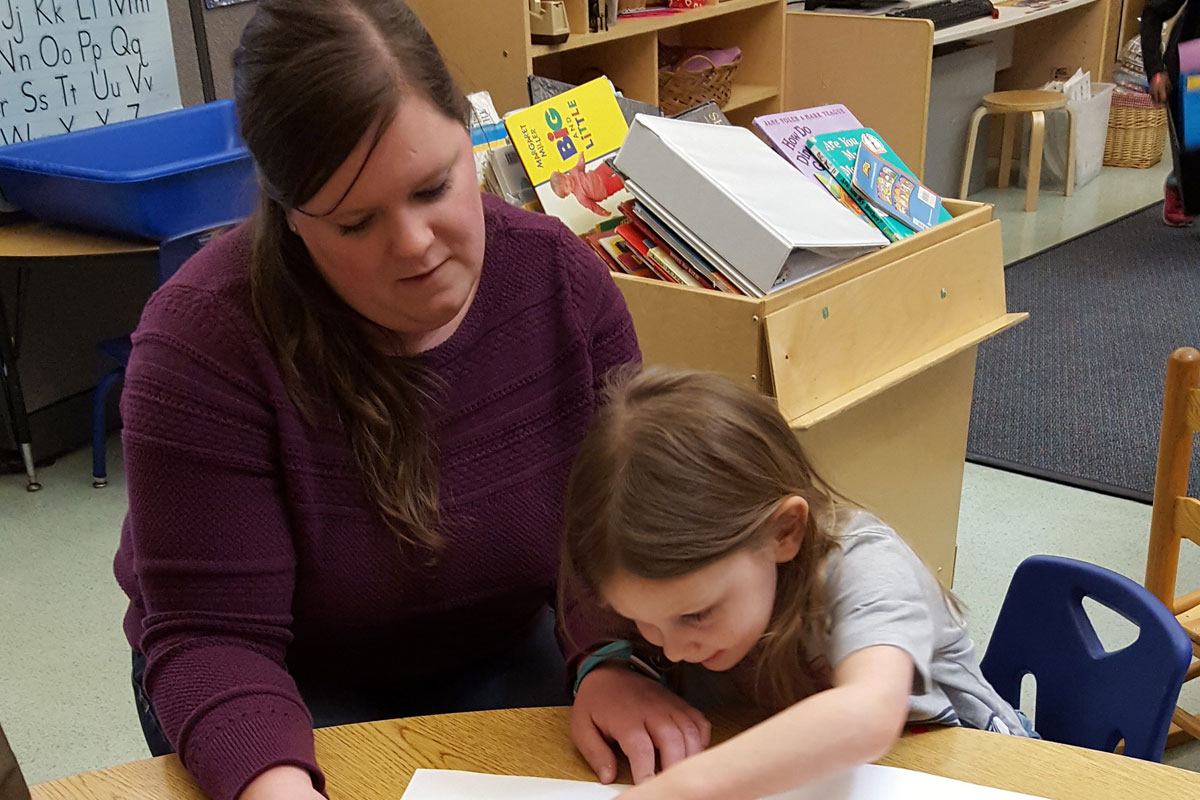 A Purdue University Northwest faculty member is studying how preschoolers best learn to count and related numerical concepts.
A Purdue University Northwest faculty member is studying how preschoolers best learn to count and related numerical concepts.
The early research of Assistant Professor of Psychology Lori Petersen suggests learning to count by observing multiple objects in a book may have greater, long-term, mathematical skill developmental benefits than learning to count by physically handling objects.
Petersen began her study last fall with 10 3-year-olds enrolled at Purdue Northwest’s Riley Child Center, a National Association for the Education of Young Children (NAEYC)-accredited facility. Located at the Hammond Campus, the center provides preschool/pre-kindergarten and kindergarten programming.
2 learning groups During the study, the children were divided into two groups: one in which the youngsters learned to count by observing groups of items displayed in books, the other in which the participants handled actual items on a desktop. Petersen engaged each child in six weekly 10-to-15-minute lessons.
“The goal of the study is to examine which approach is better to use during counting instruction,” Petersen, a Michigan City native, said. “I’m interested in environments that facilitate learning, and I’m really interested in observing counting, because it’s the first mathematical learning experience kids have.”
To that point, Petersen’s study examines children’s ability to grasp early principles of cardinality—the number of items in a given mathematical set.
Early findings She said her findings last fall indicated “the kids who were learning to count by handling objects tended to lose focus and become distracted by the items. The book learners progressed faster as number knowers.”
She is continuing her study during the current spring semester with a different sample testing group of 3-year-olds.
“We are honored that Dr. Petersen and her students have brought their expertise to our classrooms with this study,” Riley Child Center Director Tamra Bottomlee said. “This helps us better understand young children and their learning. Sharing knowledge promotes collaboration, which benefits children, staff and student teachers.”
Foundation for later math knowledge As for the significance of the study, Peterson said, “Counting is a foundation for later math knowledge. The math and reading skills children have when they begin school is predictive of how well they will learn later.”
Studying the learning habits of 3-year-olds is a far cry from Peterson’s earlier career aspiration to become an attorney.
“As part of my undergraduate curriculum I had to conduct a research project,” she said. “I wound up doing my project on the learning concepts of toddlers, and I really got into it. I am so grateful to Tamra and her staff for enabling me to do this research on campus at Riley.”
Prof. Petersen has served on the faculty at PNW and its Hammond Campus since 2015. She teaches introductory and developmental psychology courses, including Human Development I: Infancy-Middle Childhood and Human Development II: Adolescence. She holds a baccalaureate degree from Indiana University and a master’s and Ph.D. from the University of Notre Dame. She also has been a Postdoctoral Scholar at the University of Chicago.
Purdue University Northwest Purdue University Northwest (PNW), a comprehensive regional university within the Purdue University system, has two Northwest Indiana campuses in Hammond and Westville. The university was established by the unification of the former Purdue University Calumet and Purdue University North Central. With more than 15,000 students and nearly 70 undergraduate and graduate degree programs, Purdue Northwest was recognized last fall as Indiana’s fifth largest public university. For more information about PNW, visit www.pnw.edu.

